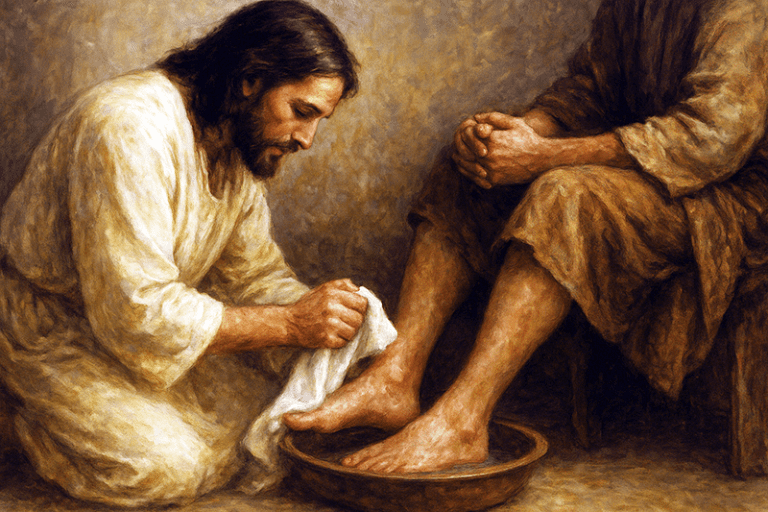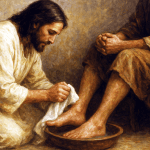Since the passing of President Russell M. Nelson, I have read many tributes and articles concerning this uncommon man. I was struck by a particular quote during an interview about his first international trip as the Prophet:
“This is a global work. Whenever I’m comfortably situated in my home, I’m in the wrong place. I need to be where the people are.” (1)
“I need to be where the people are.” That statement meshes perfectly with another phrase that has been bouncing around in my head since I heard it during a leadership training. One of the speakers mentioned hearing President Jeffrey R. Holland share the idea that Jesus didn’t have an office, emphasizing that the Savior’s ministry occurred among the people, in their homes and communities. He didn’t just sit behind a desk and assign others to do His work. His service was personal, face-to-face interaction with individuals. “… Jesus of Nazareth … went about doing good.” (Acts 10:38)
I’ve noticed this same pattern in the Book of Mormon, beginning with the first chapter:
“Lehi, as he went forth prayed unto the Lord …” (1 Nephi 1:5)
“… [Alma] delivered up the judgment-seat … And this he did that he himself might go forth among his people …” (Alma 4:18-19)
“… the sons of Alma did go forth among the people … And Alma … could not rest, and he also went forth. (Alma 43:1)
“… Helaman and his brethren went forth …” (Alma 62:45)
Why is it important “to be where the people are?”
There are moments that are seared into our memories. One such moment occurred for me after a month full of visits to elderly sisters in my neighborhood as part of my church calling. After the last visit to a sweet widow, I was stepping off her front porch when the Spirit spoke to me clearly: “This is how we will build Zion.”
This? As I pondered that message, I realized what the Holy Ghost was trying to teach me. When we make the effort to serve others and become acquainted with their stories, it is easier to love them–to appreciate what they have been through and how they became who they are today. When we know something of their history and their current struggles, we are less inclined to judge them harshly.
One of my favorite phrases from the Book of Mormon is not one that’s often quoted, but it is powerful to me. Just five words, spoken by Ammon (not the missionary) who was captured by King Limhi’s guards and imprisoned for two days. When Ammon was finally permitted to speak to the King and explain who he was, he said, “If ye had known me ye would not have suffered that I should have worn these bands.” (Mosiah 7:13) Ammon was right. Once the King knew his true identity, the bands were immediately removed.
How many people could say something similar? If you had known me, perhaps you wouldn’t have withheld your friendship, or been suspicious of me, or looked down on me for being different from you. This is why we must go forth and be where the people are–to learn their stories, to leave the comfort of our office or home and be with God’s children in the way the Savior showed us. This is how we will build Zion.
President D. Todd Christofferson spoke of a difficult but essential blessing which only comes as we interact with other people: “In the Church we not only learn divine doctrine; we also experience its application. As the body of Christ, the members of the Church minister to one another in the reality of day-to-day life. All of us are imperfect; we may offend and be offended. We often test one another with our personal idiosyncrasies.
In the body of Christ, we have to go beyond concepts and exalted words and have a real “hands-on” experience as we learn to live together in love.” (2)
How, specifically, did Jesus do good among the people?
If we want to know how the Savior spent His ministry, it is an interesting exercise to read the chapter headings in the four gospels. Here is just one example of a day in the life of Jesus Christ, as recorded in the heading of Matthew 9:
“Jesus forgives sins, heals a paralytic, and calls Matthew—Jesus eats with sinners, heals a woman who touches His garments, and raises Jairus’s daughter to life—He opens the eyes of the blind, casts out a devil, and preaches the gospel.” Talk about being where the people were!
Sister Jean B. Bingham taught that beyond the Savior’s “supernal gifts of the Atonement and Resurrection… He also smiled at, talked with, walked with, listened to, made time for, encouraged, taught, fed, and forgave. He served family and friends, neighbors and strangers alike, and He invited acquaintances and loved ones to enjoy the rich blessings of His gospel. Those “simple” acts of service and love provide a template for our ministering today.” (3)
Our official ministering assignments provide us with significant opportunities to practice Christlike living. To go forth, to see a need, to offer friendship, comfort, or other timely help. Ministering as the Savior did can put our own challenges in perspective and even lighten depression.
We are blessed when we “go forth” among the people.
My mother has been greatly blessed by going forth to serve. Here is one example in her own words:
“When our bishop challenged us to ‘thoughtfully and prayerfully think of someone in our ward who was in need and do one thing for them that was a definite sacrifice on our part,’ it was an easy choice for me. My friend Marie–nearly ninety–had been a long-time friend who was now nearly blind from the effects of macular degeneration. It was frustrating to her, but she bore her affliction with grace… She attended all of her meetings faithfully, but at the time of the bishop’s challenge, her health began to fail to the point that she could not come out to church anymore.
“When I asked if I might come and read to her one day, she responded with an enthusiastic ‘Yes!’ During each visit, we would talk for a while at first and then read a chapter [of her preferred book] and discuss it for a few minutes. One week of the month, when the Relief Society lesson would be from the new book for women, Daughters in His Kingdom, we would read the appropriate chapter from that book instead… As Marie’s health declined, I knew in my heart I would keep coming each week for as long as she lived.
“Marie always sat in her chair barefoot, and I noticed that her skin was very red and dry. I told her one day that I’d had some experience in therapeutic foot massage and asked if she would allow me to massage her feet and lower legs with lotion. She was willing, and we had some of our best conversations during these times… As the weeks passed, I started bringing homemade soup for her and her husband, and I enjoyed having lunch with them.
“Marie grew weaker each time I visited her. On my final visit, she was sitting in a wheelchair with her head down, and I knew I wouldn’t be able to read to her. I asked her gently if I could rub her feet, but she said, “No, not today. I wasn’t able to shower, and my feet might not be clean.” I told her I didn’t mind that, but asked if it would be all right with her if I brought some warm water and a cloth and washed her feet before I began to rub them. She nodded, so I went to the kitchen for the water and a cloth.
“As I knelt on the floor in front of her and began washing her feet, I looked up at my beautiful friend and thought for a moment that I felt something akin to the love Jesus must have felt as he washed the feet of His beloved disciples. Marie looked back at me through unseeing eyes and smiled ever so slightly as I finished my work of love for the final time. I wept as I left her home that day, so grateful for all I had learned during the time I had spent with her. She passed away a few days later.” (4)
Recently, I was the beneficiary of Christlike caring from a woman who “went about doing good.” A friend that I ran into at a Saturday gathering could tell I was struggling. An hour later, she showed up at my door with a treat. When I invited her in, she sat with me on my couch and listened for a long time while I poured out my struggles. There may have been some whining involved. Yet this good lady–who is in the middle of a cancer journey–looked at me with such compassion and love. I felt a huge weight lifted from my heart simply because she listened. This loving encounter not only blessed me in the moment, but has since inspired me to ask daily, “Have I done any good in the world today? Have I helped anyone in need?” (5)
My friend Sharlee claims that “mortality is a group project.” I wholeheartedly agree. What better way to honor the memory of President Russell M. Nelson than to follow his example of being where the people are, and to follow the example of Jesus Christ, who didn’t have an office, or even a place “to lay his head” (Luke 9:58), yet went about doing good.
Notes
- Russell M. Nelson, emphasis added. https://www.deseret.com/2018/4/12/20643531/the-lord-s-message-is-for-everyone-president-nelson-talks-about-global-tour/
- D. Todd Christofferson, Why the Church, October 2015 general conference.
- Jean B. Bingham, Ministering as the Savior Does, April 2018 general conference. https://www.churchofjesuschrist.org/study/general-conference/2018/04/ministering-as-the-savior-does?lang=eng
- Janice Kapp Perry, Seeking for a Deeper Joy, Meridian Magazine, January 17, 2013. https://latterdaysaintmag.com/article-1-12078/
- Will L. Thompson, Have I Done Any Good? #223, Hymns.


















